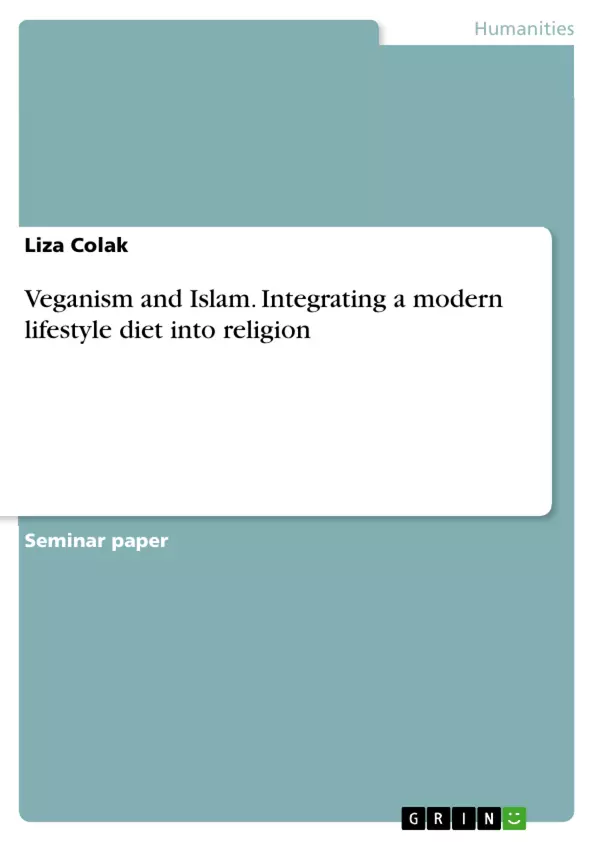In this paper the main question “How is veganism compatible with Islam?" is examined through testing the compatibility of veganism with Islam. Focusing the compatibility of a modern vegan lifestyle and nutrition with Islam, rather than the compatibility of Islam with veganism. Similarities, possible connections and the already existing common ground of these two influencing lifestyles are considered more closely.
Die Hausarbeit behandelt die Frage “How is veganism compatible with Islam?" und greift verschiedene Ansätze auf, um die Vereinbarkeit von Veganismus mit dem Islam zu untersuchen. Der Fokus liegt dabei auf der Vereinbarkeit des derzeitigen Trendverhalten einer veganen Ernährung und Lebensweise mit dem Islam und nicht die Vereinbarkeit der Religion Islam mit dem Veganismus. Es wird untersucht, wie die Verhaltensweisen einer veganen Ernährung und Lebensart in die islamische Lebensweise integriert werden können und wo es bereits Gemeinsamkeiten gibt.
Inhaltsverzeichnis (Table of Contents)
- Introduction
- Main part
- Veganism
- Islam and food restrictions
- Compatibility of Islam and veganism
- Food precepts and labels in Islam
- The prophet Mohammed as an example for muslims
- Conclusion
- Literature and sources
Zielsetzung und Themenschwerpunkte (Objectives and Key Themes)
This work examines the compatibility of veganism with Islamic beliefs and practices. It aims to explore the potential for a vegan lifestyle within the framework of Islamic dietary laws and traditions. The work also considers the growing interest in veganism among Muslim communities and the various motivations behind this trend.
- Compatibility of veganism with Islamic dietary laws and traditions.
- The role of halal certification and its impact on the consumption of meat and animal products.
- The potential for adopting a vegan lifestyle as an example of Islamic piety.
- The evolving relationship between religion, culture, and dietary choices in the contemporary world.
- The rise of veganism in Muslim communities and the motivations behind this trend.
Zusammenfassung der Kapitel (Chapter Summaries)
- Introduction: This chapter introduces the concept of veganism and its rapid growth as a dietary and lifestyle choice. It highlights the various factors driving this trend, including health, sustainability, and animal welfare concerns. The chapter then focuses on the intersection of religion and dietary habits, using India as an example of how culture, tradition, and religion influence food choices. Finally, the chapter introduces the question of veganism's compatibility with Islam.
- Main Part - Veganism: This chapter defines veganism and traces its history, distinguishing it from vegetarianism. It explores the various values and motivations behind veganism, including animal welfare, personal health, environmental concerns, and social justice. The chapter also discusses the different levels of adherence to veganism and how this varies across different groups.
- Main Part - Islam and Food Restrictions: This chapter examines the Islamic perspective on food and dietary regulations. It explores the concept of halal and its implications for the consumption of meat and animal products. The chapter also analyzes the prophet Mohammed's lifestyle and its potential connection to a vegan approach.
Schlüsselwörter (Keywords)
Veganism, Islam, Halal, dietary restrictions, food traditions, animal welfare, sustainability, religious piety, lifestyle choices, Muslim communities, ethical consumption.
Frequently Asked Questions
How is veganism compatible with Islamic dietary laws?
The paper explores how plant-based diets naturally align with Halal principles, as all plant foods are generally considered Halal unless contaminated with prohibited substances.
What is the role of Halal certification in a vegan lifestyle?
While vegan products are inherently free from animal slaughter issues, Halal certification still ensures the absence of alcohol and cross-contamination, which is important for many Muslims.
Did Prophet Mohammed follow a diet similar to veganism?
The research analyzes the Prophet's simple lifestyle, noting that he consumed very little meat and emphasized compassion for animals, which serves as a foundation for modern Muslim vegans.
Why is veganism growing in Muslim communities?
Key motivations include health benefits, concerns about industrial factory farming, environmental sustainability, and a desire to practice ethical consumption as a form of piety.
Can adopting a vegan diet be considered an act of Islamic piety?
Yes, many argue that prioritizing animal welfare and environmental protection (stewardship of the Earth) aligns closely with core Islamic values.
- Quote paper
- Liza Colak (Author), 2022, Veganism and Islam. Integrating a modern lifestyle diet into religion, Munich, GRIN Verlag, https://www.grin.com/document/1298758



